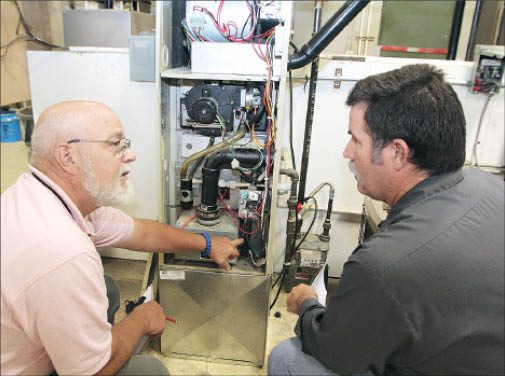
Home » HVAC/R training program in Spokane feeds need
HVAC/R training program in Spokane feeds need
Job market for HVAC/R service techicians said steady; future growth is expected

August 30, 2012
The Northwest HVAC/R Association & Training Center here expects a full enrollment of about 50 students this fall, and any graduate of the course who wants to work in the field of heating, ventilation, air-conditioning, and refrigeration, will be able to find a job, says Tena Risley the association's executive director.
The association's nine-month course qualifies its students to become service and maintenance technicians, placing them in the second or third year of an apprenticeship program and on an accelerated track to become journeymen, Risley says.
Contractors and utility providers formed the nonprofit association 50 years ago, and its training center has been accredited as a private vocational college since 1995.
The association graduated 38 students in May and June and placed nearly all of them, Risley says.
"This year, we're out of apprentices that want to work," she says.
Companies that hired recent graduates range from mom-and-pop shops to some of the largest companies in Washington, including such Spokane-based companies as Banner Furnace & Fuel Inc., R&R Heating & Air Conditioning Inc., and Sturm Heating Inc., Risley says. Some have gone to work for HVAC/R concerns in Oregon, Alaska, and California, she says.
Graduates can expect to earn an average hourly wage above $14 an hour in their first year. After five years, they can earn an average of more than $23 an hour, Risley says. The prevailing wage for HVAC/R journeymen, which is the wage required for such experienced workers on certain government projects, is close to $40 an hour, Risley says.
The next round of full-time HVAC/R service technician training courses will be conducted in two sessions. The first, which will start in September, is fully enrolled with 25 students, Risley says. The second, which will start the following month, is filling up quickly, she says.
"We expect to have a waiting list when the October class starts," Risley says.
Northwest HVAC/R occupies a 7,500-square-foot office and shop building at 204 E. Nora, which it bought last year and moved into from leased space at 811 E. Sprague.
Risley says the association's new home, which has a 4,700-square-foot lab, provides more hands-on training space than its former location.
The association employs two instructors for its full-time program and several part-time instructors for individual courses.
"We've run up to seven or eight instructors at a time," Risley says.
In the summer, the association offers individual classes for contractor employees who need continuing training and licensing, such as in electrical and plumbing aspects of HVAC/R.
The association currently is holding evening courses in home inspections and gas codes and installation, Risley says.
"You have to have workers licensed before they can work on gas pipes and furnaces in the city of Spokane," she says.
Students train at the center on both new and used equipment, much of which is donated by member contractors and suppliers.
"The used equipment is a huge resource," Risley says. "Different models have different problems in the field."
Northwest HVAC/R is accredited by the Atlanta-based Council of Occupational Education. Such accreditation assures the training meets industry standards, she says. The school also is accredited for workforce training in Washington and Idaho.
The U.S. Department of Education recognizes Northwest HVAC as an official school, making it eligible to receive federal and state education and training funds, Risley says.
Tuition for the full-time course is $6,600 plus materials fees, and students are expected to furnish their own tools.
The association has about 130 members in Eastern Washington and North Idaho, most of which are contractors or entities with large maintenance departments. The membership includes about 90 percent of the HVAC/R-related companies in Spokane County, she says.
The association also is an advocacy group for its members and the industry. One of the association's long-term goals is to persuade the Washington Legislature to require licenses for HVAC workers, similar to state-mandated licenses for electricians, plumbers, and home inspectors.
Northwest HVAC/R operates under a 15-member board of directors, including contractors, equipment suppliers, utility companies, and local governments.
Board member Terry Swanson, who owns Swanson Refrigeration, of Spokane, says 10 of the company's 13 service technicians are Northwest HVAC/R graduates. Most of them have earned multiple certifications through the training center, Swanson says.
"All of my guys have to have two to three licenses for the work we have to do," he says.
Association members have a voice in ensuring the training fits the industry's needs here, Swanson says.
"Business owners and contractors are part of this program and believe in it," he says.
Swanson says he typically hires one service tech a year, usually because of growth rather than attrition.
"I wasn't sure I was going to hire this year," he says, adding that business has picked up in recent months following a slow start to the year that likely was due to the extended cool weather. "My feeling is that construction is taking off in Spokane."
Even though purchases of new equipment waned with the slow economy, demand for service and maintenance has remained steady, Risley says.
Risley says the need for new journeyman HVAC/R workers is expected to rise in coming years as current journeymen reach retirement age.
"There will be a huge demand, not just in Spokane, but throughout the nation," she says. "Over the next eight to 10 years, 60 percent of today's workforce in the field will be gone."
Latest News
Related Articles




